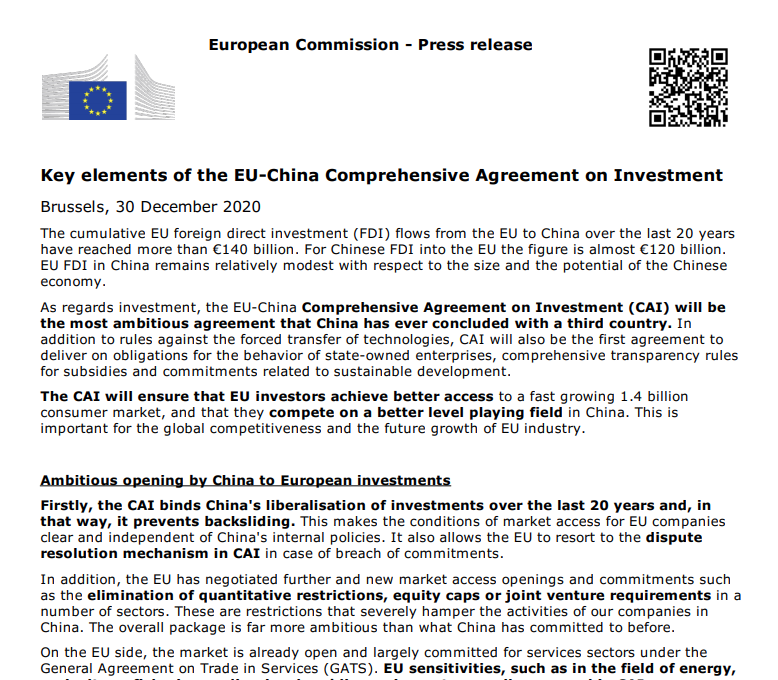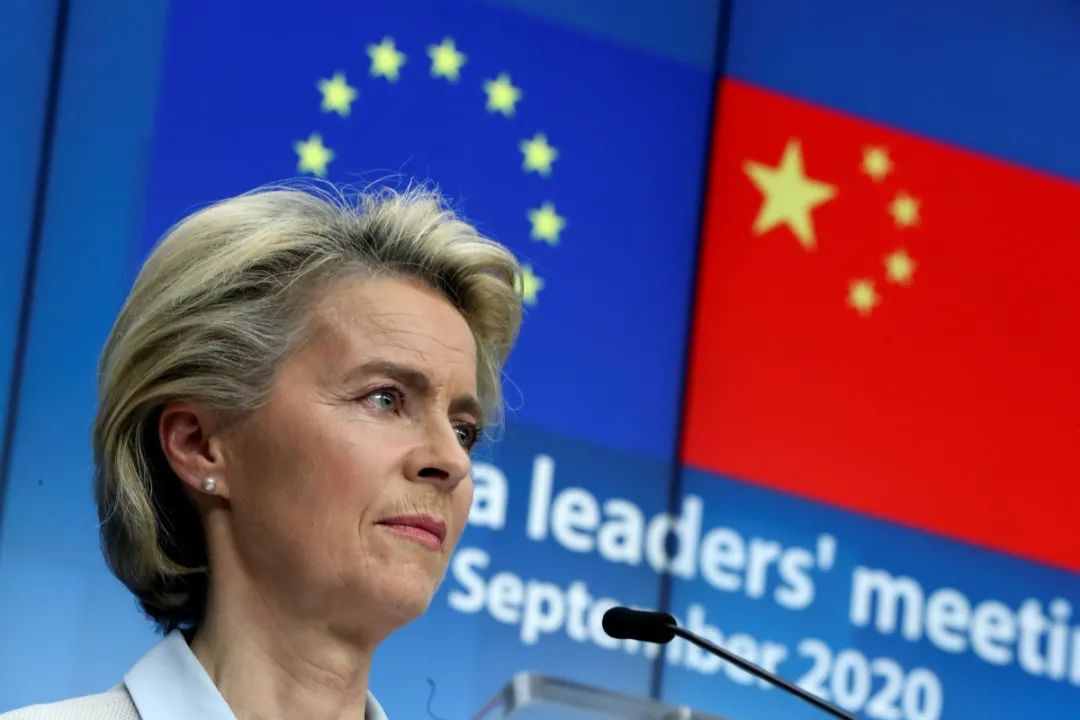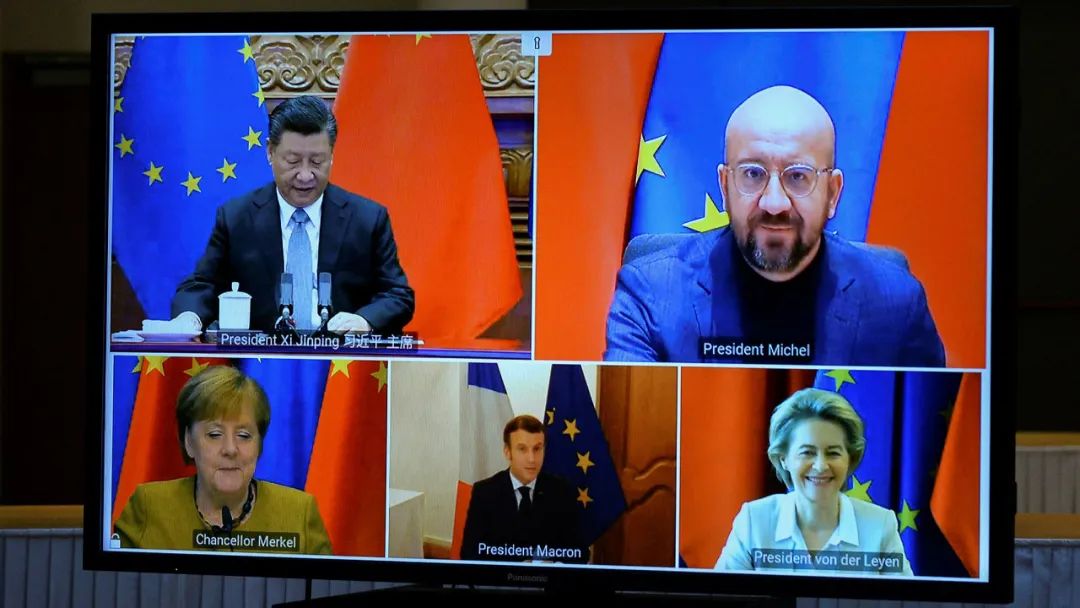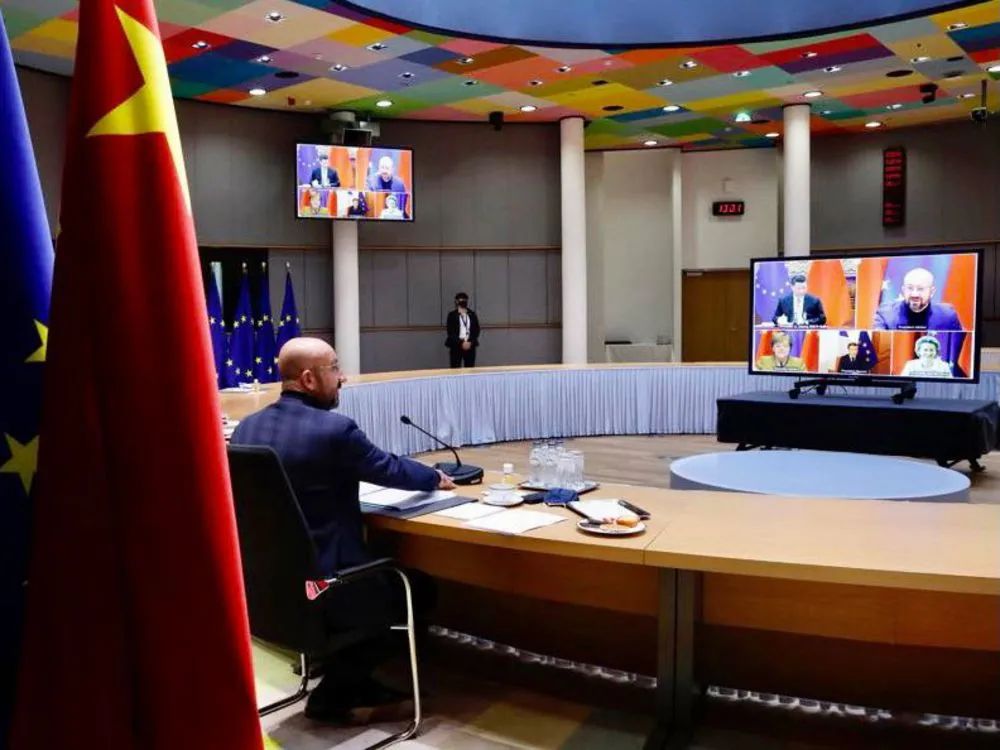背景簡要分析:
從技術層面看,中歐CAI達成后將取代中國與27個歐盟成員國中的26個國家(除愛爾蘭以外的所有國家)之間訂立的雙邊投資保護協定(Bilateral Investment Treaty, BIT)。但是,中歐CAI談判的目標并不限于此,從這一談判被命名為中歐CAI而非中歐BIT已經顯示出雙方旨在改變以往“簡式”BIT的傳統,即僅包括投資保護內容,而尋求達成包括投資自由化目標在內的更富有雄心的綜合性雙邊投資保護協定。投資自由化目標在中歐CAI 談判中主要體現為與市場準入相關的條款安排,因此,與市場準入相關條款內容的談判將決定著中歐CAI能否在年內按期完成。有鑒于此,下文擬在分析中歐雙方在市場準入方面的主要訴求的基礎上,探討中歐雙方磋商的難點并提出政策建議。
歐盟對華投資在市場準入方面的主要障礙
在市場準入方面,歐盟主要尋求在金融業、電信、信息通信技術、制造業、工程和生物技術等關鍵領域更好的市場準入和公平競爭環境。在推進中歐CAI談判過程中,歐盟委員會分別于2015年和2018年發布了其委托獨立咨詢公司對中歐CAI可持續性影響進行評估的報告。2018年發布的評估報告基于以下三個不同標準選出六個產業部門進行分析:一是歐盟對外投資規模;二是未來一段時間內中國可能會吸引歐盟投資的產業部門;三是勞動強度及其對勞動力的影響。六個產業部門是運輸設備、采礦和能源開采、化工、食品和飲料制造、金融和保險以及通信和電子設備。經研究認為,在運輸設備方面,歐盟運輸設備公司在中國投資時面臨的主要市場準入障礙是合資要求;在采礦和能源開采方面,歐盟企業在中國面臨的問題是一些子行業對外國投資開放,而其他子行業則完全封閉;在化工行業方面, 歐盟投資者在中國面臨的主要障礙是跨國公司受與國內公司不同的規則約束。在食品和飲料制造行業, 歐盟公司面臨的問題是需要中國合伙人持有多數股份,申請多個許可證書;在金融保險方面,市場準入問題包括所有權限制、股本上限和分支機構網絡擴張限制;在通訊與電子設備方面,報告認為政府鼓勵通信和電子設備行業的外國企業來華投資,但另一方面,對廣泛的外國ICT產品和服務也有嚴格的限制, 目的是實現國產替代,這導致了巨大的市場準入壁壘。
該報告認為,中國如減少對上述這六個關鍵行業外國產品和服務的限制和投資壁壘,所有這些行業均將從中歐CAI中受益,而歐盟在這些行業產出的增加則會導致歐盟低技能和高技能就業人數的增加, 并且一些產業部門的開放,還會使歐盟之外的國家也受益,例如汽車業。此外,歐盟和中國的中小企業也將從中歐CAI中受益,因為它們通常會因投資相關障礙而面臨不成比例的成本,歐盟和中國的本地中小企業都有望獲得積極的市場準入和生產率溢出效應。
中文版協定核心內容:
在過去的20年中,從歐盟流入中國的歐盟累計外國直接投資(FDI)已超過1400億歐元。對于中國對歐盟的直接投資,這一數字接近1200億歐元。就中國經濟的規模和潛力而言,歐盟在中國的外國直接投資仍然相對較少。

在投資方面,中歐全面投資協定(CAI)將是中國與第三國締結的最雄心勃勃的協定。除了禁止強制轉讓技術的規則外,CAI還將成為首個履行對國有企業行為的義務,對補貼的全面透明規則以及與可持續發展有關的承諾的協議。
CAI將確保歐盟投資者更好地進入快速增長的14億消費市場,并確保他們在中國的公平競爭環境中競爭。這對于全球競爭力和歐盟工業的未來發展非常重要。

中國雄心向歐洲投資開放
首先,CAI約束了中國過去20年的投資自由化,從而防止了回落。這使歐盟公司的市場準入條件變得清晰且獨立于中國的內部政策。它還允許歐盟在違反承諾的情況下在CAI中訴諸爭端解決機制。
此外,歐盟還就更多領域的新的市場準入開放和承諾進行了談判,例如取消了數量限制,股本上限或合資企業要求。這些限制嚴重阻礙了我們公司在中國的業務。總體方案比中國以前承諾的要遠大得多。
在歐盟方面,根據《服務貿易總協定》(GATS),服務市場已經開放并為服務行業做出了很大的承諾。歐盟在能源,農業,漁業,視聽,公共服務等方面的敏感性都保留在CAI中。
中國的市場準入承諾示例:

改善公平競爭環境–使投資更公平
將可持續發展納入我們的投資關系
監督執行和爭端解決

英文版協定內容:
The cumulative EU foreign direct investment (FDI) flows from the EU to China over the last 20 years have reached more than €140 billion. For Chinese FDI into the EU the figure is almost €120 billion. EU FDI in China remains relatively modest with respect to the size and the potential of the Chinese economy.
As regards investment, the EU-China Comprehensive Agreement on Investment (CAI) will be the most ambitious agreement that China has ever concluded with a third country. In addition to rules against the forced transfer of technologies, CAI will also be the first agreement to deliver on obligations for the behavior of state-owned enterprises, comprehensive transparency rules for subsidies and commitments related to sustainable development.
The CAI will ensure that EU investors achieve better access to a fast growing 1.4 billion consumer market, and that they compete on a better level playing field in China. This is important for the global competitiveness and the future growth of EU industry.
Ambitious opening by China to European investments
Firstly, the CAI binds China's liberalisation of investments over the last 20 years and, in that way, it prevents backsliding. This makes the conditions of market access for EU companies clear and independent of China's internal policies. It also allows the EU to resort to the dispute resolution mechanism in CAI in case of breach of commitments.
In addition, the EU has negotiated further and new market access openings and commitments such as the elimination of quantitative restrictions, equity caps or joint venture requirements in a number of sectors. These are restrictions that severely hamper the activities of our companies in China. The overall package is far more ambitious than what China has committed to before.
On the EU side, the market is already open and largely committed for services sectors under the General Agreement on Trade in Services (GATS). EU sensitivities, such as in the field of energy, agriculture, fisheries, audio-visual, public services, etc. are all preserved in CAI.

Examples of market access commitments by China:
Manufacturing: China has made comprehensive commitments with only very limited exclusions (in particular, in sectors with significant overcapacity). In terms of the level of ambition, this would match the EU's openness. Roughly half of EU FDI is in the manufacturing sector (e.g. transport and telecommunication equipment, chemicals, health equipment etc.). China has not made such far-reaching market access commitments with any other partner.
Financial services: China had already started the process of gradually liberalising the financial services sector and will grant and commit to keep that opening to EU investors. Joint venture requirements and foreign equity caps have been removed for banking, trading in securities and insurance (including reinsurance), as well as asset management.
Health (private hospitals): China will offer new market opening by lifting joint venture requirements for private hospitals in key Chinese cities, including Beijing, Shanghai, Tianjian, Guangzhou and Shenzhen .
Computer services: China has agreed to bind market access for computer services - a significant improvement from the current situation. Also, China will include a ‘technology neutrality' clause, which would ensure that equity caps imposed for value-added telecom services will not be applied to other services such as financial, logistics, medical etc. if offered online.
International maritime transport: China will allow investment in the relevant land-based auxiliary activities, enabling EU companies to invest without restriction in cargo-handling, container depots and stations, maritime agencies, etc. This will allow EU companies to organise a full range of multi-modal door-to-door transport, including the domestic leg of international maritime transport.
Air transport-related services: While the CAI does not address traffic rights because they are subject to separate aviation agreements, China will open up in the key areas of computer reservation systems, ground handling and selling and marketing services. China has also removed its minimum capital requirement for rental and leasing of aircraft without crew, going beyond GATS.
Business services: China will eliminate joint venture requirements in real estate services, rental and leasing services, repair and maintenance for transport, advertising, market research, management consulting and translation services, etc.
Environmental services: China will remove joint venture requirements in environmental services such as sewage, noise abatement, solid waste disposal, cleaning of exhaust gases, nature and landscape protection, sanitations and other environmental services.
Improving level playing field – making investment fairer
State owned enterprises (SOEs) - Chinese SOEs contribute to around 30 percent of the country's GDP. CAI seeks to discipline the behaviour of SOEs by requiring them to act in accordance with commercial considerations and not to discriminate in their purchases and sales of goods or services. Importantly, China also undertakes the obligation to provide, upon request, specific information to allow for the assessment of whether the behaviour of a specific enterprise complies with the agreed the CAI obligations. If the problem goes unresolved, we can resort to dispute resolution under the CAI.
Transparency in subsidies – The CAI fills one important gap in the WTO rulebook by imposing transparency obligations on subsidies in the services sectors. Also, the CAI obliges China to engage in consultations in order to provide additional information on subsidies that could have a negative effect on the investment interests of the EU. China is also obliged to engage in consultations with a view to seek to address such negative effects.
Forced technology transfers – The CAI lays very clear rules against the forced transfer of technology. The provisions consist of the prohibition of several types of investment requirements that compel transfer of technology, such as requirements to transfer technology to a joint venture partner, as well as prohibitions to interfere in contractual freedom in technology licencing. These rules would also include disciplines on the protection of confidential business information collected by administrative bodies (for instance in the process of certification of a good or a service) from unauthorised disclosure. The agreed rules significantly enhance the disciplines in WTO.
Standard setting, authorisations, transparency – This agreement covers other long-standing EU industry requests. China will provide equal access to standard setting bodies for our companies. China will also enhance transparency, predictability and fairness in authorisations. The CAI will include transparency rules for regulatory and administrative measures to enhance legal certainty and predictability, as well as for procedural fairness and the right to judicial review, including in competition cases.
Embedding sustainable development in our investment relationship
In contrast to other agreements concluded by China, the CAI binds the parties into a value-based investment relationship grounded on sustainable development principles. The relevant provisions are subject to a specifically tailored implementation mechanism to address differences with a high degree of transparency and participation of civil society.
China commits, in the areas of labour and environment, not to lower the standards of protection in order to attract investment, not to use labour and environment standards for protectionist purposes, as well as to respect its international obligations in the relevant treaties. China will support the uptake of corporate social responsibility by its companies.
Monitoring of implementation and dispute settlement
注:本文中文翻譯自歐盟委員會公開網站及中國發展觀察,英文為原文字
